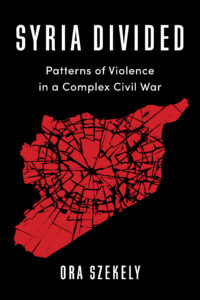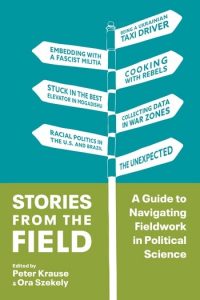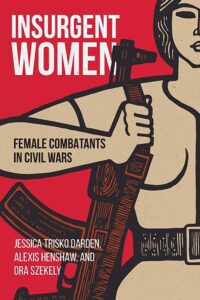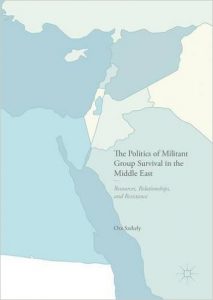Syria Divided: Patterns of Violence in a Complex Civil War (2023) Columbia University Press
 The civil war in Syria—which has claimed more than 600,000 lives and displaced over half of the country’s population since 2011—is an enormously complex conflict whose many participants understand and explain the war in a range of different ways. For some, it is a fight for dignity and democracy; for others, a sectarian or communal conflict; still others see it as a fight against terrorism or a consequence of foreign interference.
The civil war in Syria—which has claimed more than 600,000 lives and displaced over half of the country’s population since 2011—is an enormously complex conflict whose many participants understand and explain the war in a range of different ways. For some, it is a fight for dignity and democracy; for others, a sectarian or communal conflict; still others see it as a fight against terrorism or a consequence of foreign interference.
Syria Divided draws on on in-depth interviews, conflict data, and propaganda distributed through social media to examine how these competing narratives have shaped the course of the conflict. Mapping out the broad patterns of violence among combatants and against civilians, the book argues that the competition to control the narrative in the eyes of important audiences at home and abroad has not only influenced the choices of participants, it has also—shaped in part by the use of social media—led many to treat warfare as a kind of performance.
Stories from the Field: A Guide to Navigating Fieldwork in Political Science. Editor, with Peter Krause. (2020) Columbia University Press
 What do you do if you get stuck in an elevator in Mogadishu? How worried should you be aboutbeing followed after an interview with a ring of human traffickers in Lebanon? What happens to your research if you get placed on a government watchlist? And what if you find yourself feeling like you just aren’t cut out for fieldwork?
What do you do if you get stuck in an elevator in Mogadishu? How worried should you be aboutbeing followed after an interview with a ring of human traffickers in Lebanon? What happens to your research if you get placed on a government watchlist? And what if you find yourself feeling like you just aren’t cut out for fieldwork?
Stories from the Field is a relatable, thoughtful, and unorthodox guide to field research in political science. It features personal stories from working political scientists from a diverse range of biographical and academic backgrounds, covering research in North and South America, Africa, Asia, Europe, and the Middle East, ranging from archival work to interviews with combatants. The contributors reflect not only on their own experiences but also on larger questions about research ethics, responsibility, and the effects of their personal and professional identities on their fieldwork.
Insurgent Women: Female Combatants in Civil Wars. With Jessica Trisko Darden and Alexis Henshaw (2019) Georgetown University Press.
 Women’s participation in asymmetric violence and civil war is both widespread and tremendously varied. At the same time, however, it is often treated as an afterthought in the literature on civil war. Insurgent Women explores the multiple dimensions of women’s participation in asymmetric armed conflict, including their recruitment into armed groups, what their participation looks like once they’ve joined, and their experiences after civil war. It offers in-depth case studies of the roles played by women in the civil wars in Ukraine, Colombia, and the Kurdish regions of Turkey, Syria and Iraq.
Women’s participation in asymmetric violence and civil war is both widespread and tremendously varied. At the same time, however, it is often treated as an afterthought in the literature on civil war. Insurgent Women explores the multiple dimensions of women’s participation in asymmetric armed conflict, including their recruitment into armed groups, what their participation looks like once they’ve joined, and their experiences after civil war. It offers in-depth case studies of the roles played by women in the civil wars in Ukraine, Colombia, and the Kurdish regions of Turkey, Syria and Iraq.
The Politics of Militant Group Survival in the Middle East: Resources, Relationships, and Resistance. (2016) Palgrave Macmillan.
 Why is it that multiple nonstate armed groups, fighting the same adversary, on the same territory experience very different outcomes, even when they have access so similar resources? This book explores this question by comparing the experiences of four major armed groups in the Arab-Israeli conflict ecosystem: PLO, Amal, Hizbullah and Hamas. The roots of an organization’s ability to survive its confrontations with far more powerful adversaries lie in its foreign and domestic policy choices. Based on interviews with movement members and adversaries, critics and supporters, I find that the strategies which organizations use to obtain both tangible and intangible resources are ultimately just as important as the resources themselves.
Why is it that multiple nonstate armed groups, fighting the same adversary, on the same territory experience very different outcomes, even when they have access so similar resources? This book explores this question by comparing the experiences of four major armed groups in the Arab-Israeli conflict ecosystem: PLO, Amal, Hizbullah and Hamas. The roots of an organization’s ability to survive its confrontations with far more powerful adversaries lie in its foreign and domestic policy choices. Based on interviews with movement members and adversaries, critics and supporters, I find that the strategies which organizations use to obtain both tangible and intangible resources are ultimately just as important as the resources themselves.
